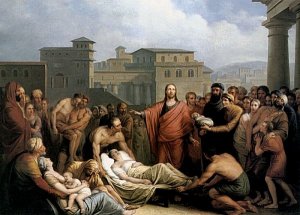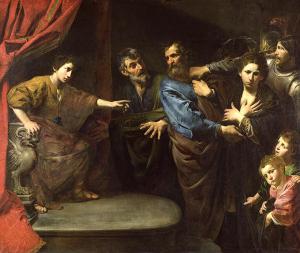Psalm 62: Trust in God Alone
Wednesday, March 29, 2023
![images[11]](https://thenoontimes.files.wordpress.com/2011/12/images11.jpg?w=150)
As we prepare for the celebration of Easter, we return to some Christmastide meditations from 2011 and we reflect on how the Passion and Easter stories begin in a stable in Bethlehem.
My soul rests in God alone, from whom comes my salvation, God alone is my rock and salvation, my secure height; I shall never fall.
From the footnotes in the New American Bible: “A song of trust displaying serenity from experiencing God’s power [the refrains of 2-3 and 6-7] and anger toward unjust enemies [4-5]. From the experience of being rescued, the psalmist can teach others to trust in God [10-13]”. (Senior 686)
We lament the lack of trust in our society; we complain that we cannot rely on civic or religious leaders; but before we complain we must examine ourselves. Are we worthy of trust? Do we act with authenticity? Do we live a life of integrity?
We look at the corruption we see in high places and point out abuses of power; but before we criticize others we must live a life devoid of corruption ourselves. Have we eliminated words of bias from our lexicon? Have we removed acts of favoritism from our lives? Do we reject the use of nepotism to get ahead?
We look back through our own trials and when we are honest we can number the times we have been rescued by God; but before we grumble about God’s absence when we need him we must be candid about the powerful presence God is in the universe. Does God exist to please us alone? Do our own wants go before those of others? Do we expect God to appease us at the expense of the common good?
We lose patience with those who are forever negative, downcast or anxious; but before we grumble about our neighbors we must take a look at how often we have helped others to find their way to a positive way of living. Do we gossip about the broken-hearted? Do we remain happy by avoiding those who suffer a series of difficult events? Do we hoard happiness and fear that those who appear to be unlucky may contaminate the Eden we have set up for ourselves?
We fool ourselves if we believe that we alone rescue ourselves from calamity.
We trick ourselves if we say that we do not need God.
We disappoint ourselves if we say that God has abandoned us.
We deceive ourselves if we say that God is not the source of goodness and kindness.
The psalmist today tells us one idea, and he tells it simply: God is good, God saves, God abides, God rescues, we can rely totally and fully on God, we must pray for our enemies and leave them in God’s hands, we must sing God’s praise for keeping us from the fall.
Before we complain about how God does not answer our petitions, we must look for goodness in ourselves and in others . . . for this goodness reflects God’s kindness. Tell others how God has rescued us.
Before we complain about how God does not answer our call, we must look for trustworthiness in ourselves and in others . . . for this trustworthiness reflects God’s constancy. Tell others how God has answered us.
Before we complain about how God does not answer our prayers, we must look for charity in ourselves and in others for this charity reflects God’s love. Tell others how much God is devoted to us, and trust God, trust God alone.
Senior, Donald, ed. THE CATHOLIC STUDY BIBLE. New York, Oxford University Press, 1990.686. Print.
Image from: http://borivaliassembly.net/index.php/ministry-corner/assurance-of-salvation/
39.533225
-76.430369
Read Full Post »





![images[11]](https://thenoontimes.files.wordpress.com/2011/12/images11.jpg?w=150)






